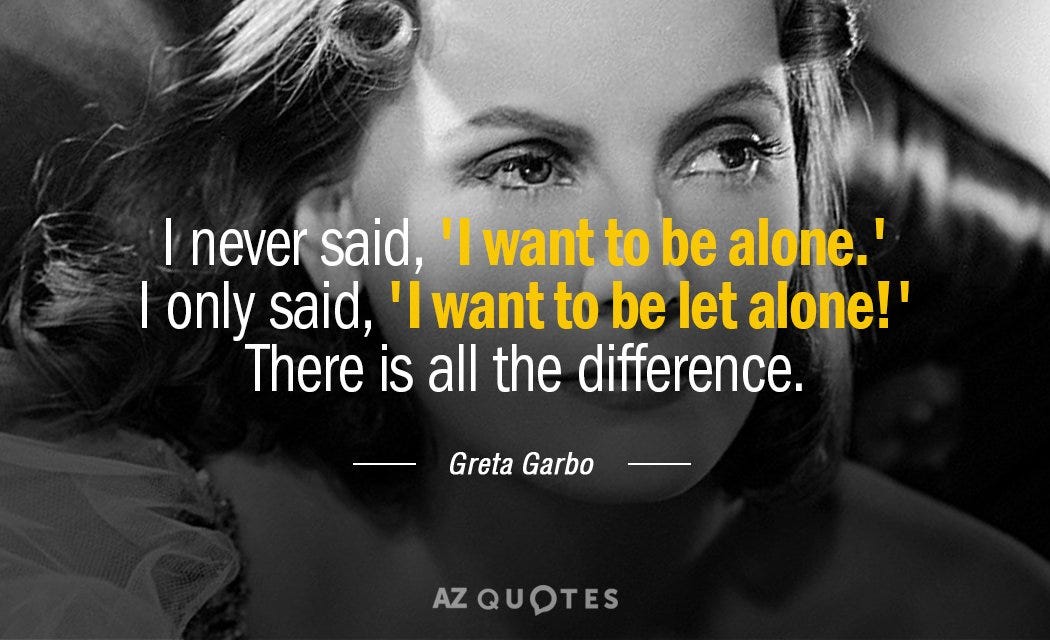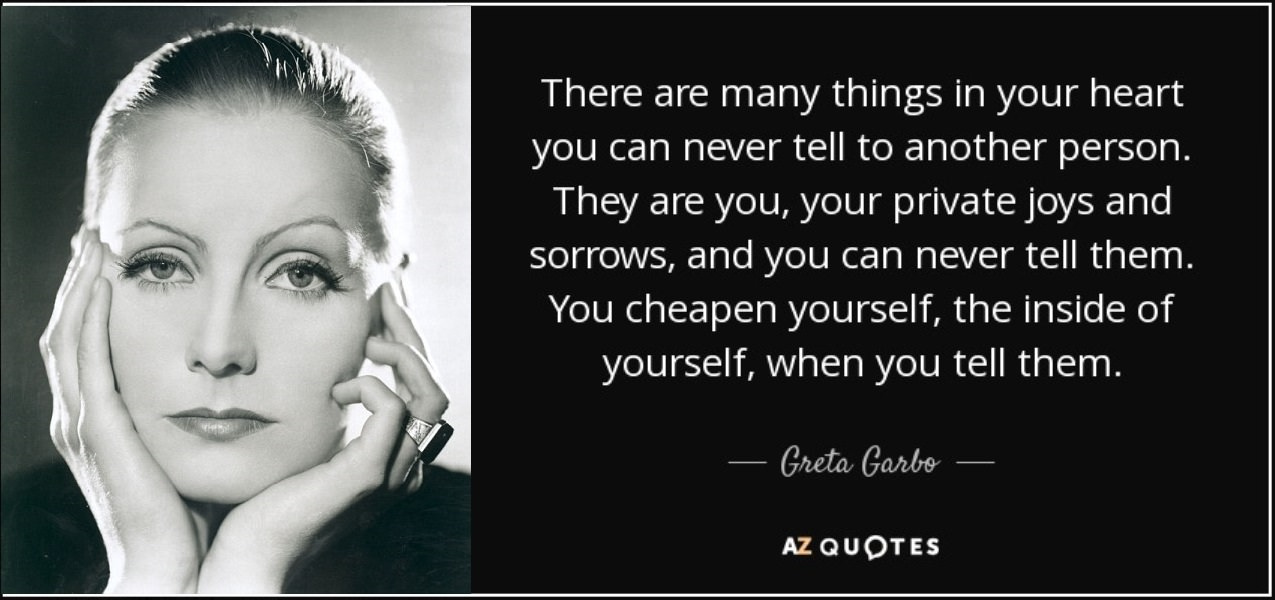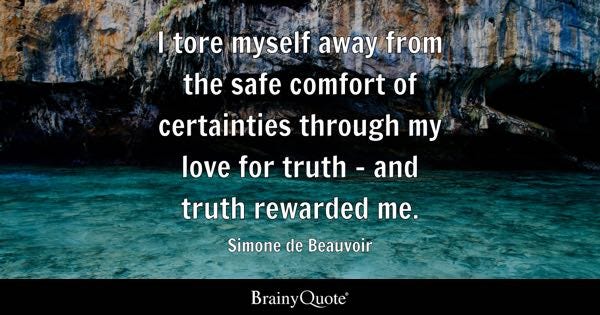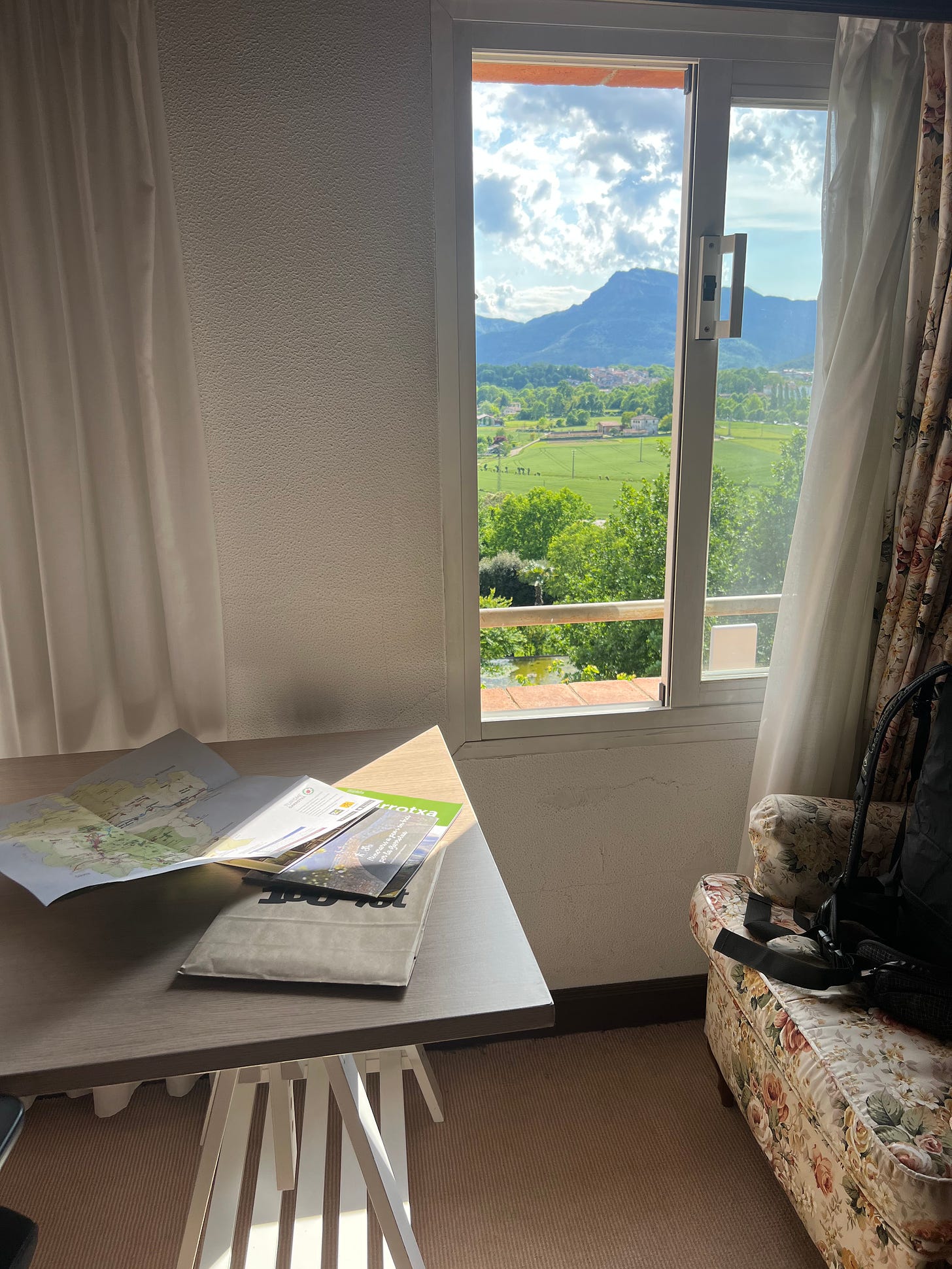I'm a spinster! I spin well!
A few comforting words for single/childless people on the planet
A while back I was reading British radical Sara Maitland’s How to Be Alone and learned the origins of the word spinster.
“In the Middle Ages the word “spinster” was a compliment. A spinster was someone, usually a woman, who could spin well: a woman who could spin well was financially self-sufficient – it was one of the very few ways that mediaeval women could achieve economic independence. The word was generously applied to all women at the point of marriage as a way of saying they came into the relationship freely, from personal choice, not financial desperation.”
Maitland adds:
“Now it is an insult, because we fear “for” such women — and now men as well — who are probably “sociopaths.””
Over the centuries, women’s economic independence progressed to be something a woman could take with her into a solo life. It went beyond being an economic virtue within the institution of marriage; it began to contravene the tidy capitalist imperative.
Dot-dot-dot the term took on a dark slant.
I think we can agree, spinster is certainly not a true equivalent to “bachelor”.
(I want to add for colour: Maitland was an OG second wave feminist; is a lifelong friend of Bill Clinton, whom she met while studying at Oxford University; suffered debilitating “mental disarray” throughout her life; worked with Stanley Kubrick on the film A.I. Artificial Intelligence; converted to Catholicism as an adult; and now lives an entirely solitary life in Ireland somewhere.
I like the whole contradictory picture. Her life has contained multitudes. I should also say, Maitland has two kids herself. And I’ve reached out several times to get her on my podcast, to no avail.)
I was reminded of this aetiology of spinsterism on Sunday, as Australia and the States celebrated Mother’s Day. I passed a thought for women who don’t/couldn’t have children and find the day confronting. Instagram is terrible place on such days. Obviously I didn’t/couldn’t have kids (my story is more complicated than it having been a choice), but I think I’ve healed enough of my grief around it all to be able to weather the mother imperative that still permeates in our culture. And in part because I do regularly remind myself of this original take on spinster - a woman who can spin well.
I think I spin well…
And so I have been able to live a life beyond the mothering imperative and enter into most of my relationships freely and with artful intention, whether it be fostering, being an aunt, being a lover, a writer, a yearner. Spinning well has enabled me to relate fully and consciously.
I arrive at this comforting life-take, mostly, by doing a lot of that “soul nerding” stuff I often talk about - studying the life and works of great humans before me who made similar choices - or faced similar fates - to my own and wrote about how they resolved the pain that came with said choices and fates.
I thought I’d share a few here….
Let’s take Greta Garbo
You might like to know this: After giving up acting, Garbo adopted a lifestyle of both simplicity and leisure. She called it ‘drifting’.
She had close friends, she socialised and travelled.
Garbo never married, never had kids, but had love affairs with both men and women.
She collected art. She walked - alone and with her many companions.
She famously gave good face, but she also gave good quote:
There are many biographies written about her life. Or you can soul nerd via this New Yorker article.
Simone de Beauvoir also spun well
De Beauvoir did not want kids or to serve her husband breakfast or deal with wet towels on the floor. She was in a committed relationship with Jean Paul Satre for 51 years but never lived with him, and took other lovers over the decades.
She described motherhood as entailing a “fatal patience” that women learn.
“One of the reasons people lock onto motherhood as a key to feminine identity is the belief that children are the way to fulfill your capacity to love. But there are so many things to love besides one's own offspring, so many things that need love, so much other work love has to do in the world.”
This quote reminds me of the time I visited a shaman in Bali, a “peer” of the one that Elizabeth Gilbert visited in Eat Pray Love. He told me I don’t much go for relationships. And that I shouldn’t. Go for them, that is. Nor should most women like me. If we want to be happy.
“Relationships block you from relating,” he told me.
I was in my mid-30s when I get hit with this explosive premonition. It was confronting. But it would seem the good shaman had “seen” something of my future…
Some other spinster soul nerding comfortings:
Martha Gellhorn’s biography
One of my favourite books is Martha Gellhorn: A Life, by Caroline Moorehead. It’s not particularly well written, but it’s super thorough in chronicling every letter and essay that the wild journalist Gellhorn wrote. I found it invigorating (is that the word?) to learn of (from?) another woman who was driven to give the good fucks about the right thing, but struggled with the seductive pull to be well behaved. She married Ernst Hemingway for a bit, never had a child of her own, but did adopt a boy.
I love poet Mary Oliver talking to Krista Tippett
This is a wonderful podcast, recorded some time back on On Being. I start First We Make the Beast Beautiful with her poem The Journey. I offer a large nod to her poem A Summer’s Day in This One Wild and Precious Life. Oliver, bucked many things to journey to truth, the kind that makes our spirits feel recognition and attunement. As Tippett puts it: Amid the harshness of life, Mary Oliver found redemption in the natural world and in beautiful, precise language.
Oliver, who died in 2019 at age 83, didn’t have kids and was in a lesbian relationship for five decades. I love this line from her:
When it’s over, I want to say: all my life
I was a bride married to amazement.
I was the bridegroom, taking the world into my arms.
Virginia Woolf’s A Room of One’s Own.
In A Room of One’s Own, Woolf plays deeply and cheekily with being the sex who watches and works around the other sex. I’ve written more fully about it here….should you want to “soul nerd” lightly.
Have I missed any? Do share inspiring spinning tales in the comments.
OK, I’m going back to my responsibilities as a very lucky person who has been granted a spot at an artists’ residency in the north of Spain. Here’s my current view in my room of one’s own:
I’ll share more on Friday.
Sarah xx








Thank you for this, Sarah. I’ve been on the search for stories about women who choose/can’t have children.
Georgina Reid’s conversation in DF magazine issue 70 really struck a chord with me. I was so grateful for her story. She talks about “other-mothering” which, somehow over time, morphed into “big mothering” in my mind.
She refers to artist Janet Laurence who has been a guide to her: “If you don’t have kids, think of how expansive your care can be.”
I appreciate Georgina honestly sharing her grief around not becoming a mother. She says:
“There will always be some kind of grief around not becoming a mother. I think it’s important to acknowledge that holes exist in every life, and no one decision means you can avoid them.”
“So I closed one door and opened another. I feel a responsibility- to do something with this space, this freedom, to grow and care in ways that are right for me.”
I think you are doing this too, Sarah. Other/big-mothering. Caring in ways that are right for you. x
This is just what I needed right now, in this moment. Thank you! Beautiful!
My journey was somewhat similar to yours. I was undecided and then took the decision in my late 30’s to go it alone with donor sperm. It didn’t work out.
I eventually healed, mostly, and now am in a relationship with a younger man who doesn’t want children. His friends are having many many children right now and have commented on what a shame it is that he won’t have them because he would make a wonderful father. And Bam! Triggered!
I will use this as my mantra at those triggered moments. I spin really f*cking well :) 🙏